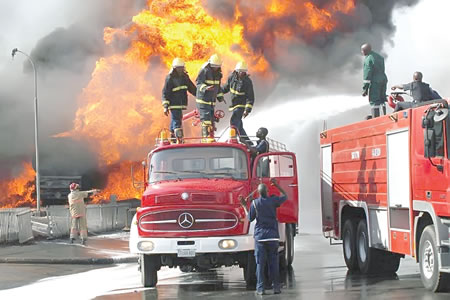LATE last year, the harmattan season set in again bringing with it series of fire disasters across the country. In Lagos, there were fire disasters at the popular Balogun market on the Lagos Island; Super Plaza, a mall in Surulere area of the state; Tejuoso market in Yaba and Kara cattle market, on the border with Ogun State. The tragedies were not unexpected, but preparations, as always, were inadequate.
Ibadan, the capital city of Oyo State, was not spared of the seasonal fire outbreaks. Just a few days into the New Year, one family lost three children in a fire outbreak which occurred at Molete area of the city. Though no one could say precisely how the fire started, the children were said to have been left alone inside their two-room apartment by their parents.
Roughly 48 hour later, there was another fire outbreak in Oyo town where the 400-year-old Akesan market was reduced to rubbles in which properties worth millions of naira were lost.
Following the tragedy was the shooting of three young boys who were part of the mob that went wild after officials at the fire station claimed they could not do anything to quench the fire because there was no water in their firefighting truck. The situation was particularly pathetic because the fire station is only a few metres to the market.
Governor Seyi Makinde during a visit to the scene promised to rebuild the market, just as he promised that his government would soon acquire 10 modern firefighting equipment. His promise indirectly was an acknowledgment of lack of adequate firefighting equipment. Even at the federal level, the fire service, no additional equipment were procured for about 11 years as confirmed on January 4, 2017 by then interior minister, Lieutenant General AbdulrahmanDambazzau (retd) after a Federal Executive Council meeting.
The question now is: If at the federal level, adequate firefighting equipment were lacking, what is expected to be the situation at the state level where there is less resources to fund this all-important but often neglected department?
Predictably, the Lagos State Fire Service is the busiest of all the state fire services in the country and could rival the Federal Fire Service in the area of equipment and manpower.
As of the time of BabatundeFashola’s administration, the latest firefighting equipment were acquired. AkinwunmiAmbode’s administration also built on Fashola’s achievements by creating a bigger emergency management team which gave a bigger role to the state fire service. The fire agency became an integral part of the Lagos Response Unit which also included the Lagos State Emergency Management Agency (LASEMA ).
Ironically, even in Lagos State, the state fire service is supervised by the Ministry of Special Duties with 15 fire stations in different parts of the state which are Isolo, Ikeja, Agege, Epe, Ikorodu, EtiOsa, Badagry, Ilupeju, Ojo, Iganmu, Ikotun, Lekki Phase 2, Onikan and Abesan Estate, including its headquarters in Alausa.
Given the cosmopolitan nature of the state, the fire service responds to an average of five distress calls in a day. A fire officer who pleaded for anonymity because he was not allowed to speak officially said: “Our greatest challenge is constant attacks from hoodlums. We have lost some of our men to attacks and many of them have been injured in the past. It is either they accuse us of coming late or that we are slow in our operation.”
Tales of woe
The Chief Fire Officer of the Oyo State Fire Service, Mr Adewuyi Moshood, while speaking with Sunday Tribune two days after the Oyo market fire incident, shed more light on the problems often encountered by fire officers.
He told Sunday Tribune that his men had prepared their fire truck with enough water when they got a call notifying them of the outbreak, but what happened later was against their expectations.
“As we were about leaving for the scene, the fire truck’s gearbox developed a fault. That was why we had to send for another fire truck from Ibadan. While the truck from Ibadan was yet to come, my men and I rushed down to the scene to use bucket and other water supply alternatives within the market vicinity to lessen the intensity of the fire.
“But on getting there, it was only the tailor’s shop that was engulfed in flames. As we tried to prevent the fire from spreading to other shops, a gang of hoodlums attacked us. In the face of their harmful confrontations, I asked my men to leave the scene and report straight to our Ibadan office as the hoodlums descended heavily on our zonal office at Oyo in their fury,” Adewuyi explained.
Part of the grouse of the armed youths who allegedly attacked the fire officers was that they should not have arrived at the scene of the fire outbreak without a fire engine, despite the officers’ explanation that their only fire engine had broken down.
Aside inadequate number of firefighting equipment, investigations by Sunday Tribune showed that the number of fire service stations in the state is also inadequate. According to the Assistant Director of the state fire service, MrIbidapoBamise, there are 13 fire stations across the 33 local government areas in the state.
“We need private companies and individuals to assist us with more fire stations and fire trucks because the government cannot do it alone, though the governor has promised 10 more fire stations and possibly ensure there is a fire station in each of the 33 local governments in the state’s 2020 budget. We solicit for cooperation from private companies because a fire station is not enough for a local government,” Ibidapo said.
Poor remuneration and incentives are other factors militating against the productivity and efficiency of fire officers. According to Ibidapo, “the remuneration is poor. Though we have written some memo on that, we are still expecting the government response. The Nigerian Security and Civil Defence Corps officers earn far better salaries than the fire service operatives. Where the fire service officers earn N50 as hazard allowance, so many organisations pay much more.
“Aside the hazard allowance, there are others that we are not enjoying, though government has promised to act positively,” Ibidapo added.
As a result of this situation, many officers had resigned their appointments, leading to shortage of skilled manpower in service.
“Regarding manpower, the government recruited about 170 officers six years ago to join the fire service. But due to poor incentive, many of them have left the fire service in search of greener pasture. Notwithstanding, the rest of us available are capable of tackling any fire challenges that may arise,” Ibidapo said, noting that bad roads and traffic gridlock also hinder the effectiveness of fire officers in cases of emergency.”
A poorly remunerated, equipped workforce
Several other states across the country are not faring better. Ekiti State with 16 local government areas has only seven fire service stations with one each in Ado Ekiti, Ekiti West, Ijero, Ikere, Ikole, Ekiti-East and Ido/Osi local government areas. What this means is that when there is a fire outbreak in some areas of the state, fire engines would have to come from a long distance during which much damage would have been done.
Director of Ekiti State Fire Service, Mr. Samuel Olugbenga Omoniyi, would however wish that all the local government headquarters have their own fire stations. In an interview with Sunday Tribune, he advised Governor KayodeFayemi to ensure that all local government areas have well-equipped fire service stations which will help to respond and be effective in record time.
In Ondo State, there are only six stations serving more than 18 local government areas and most of the equipment are not functioning efficiently. The six stations, aside the headquarters in Akure, are Ondo, Ore, Okitipupa, Owo, Ikare-Akoko and Oka-Akoko stations. In fact, according to sources, the headquarters of the fire station in Akure serves about four or five local government areas.
Even while there are only seven vehicles serving the whole state, insiders told Sunday Tribune that only three of the seven vehicles are functional, while only the Owo station has access to constant water supply. One thing however continues to motivate fire officers in the state and that is regular salary and promotion as at when due.
Unfortunately given the hazard of the job, there is no insurance policy for the officers even after so many letters had been written to consider putting in place an insurance scheme for them.
“I can tell you authoritatively that there is nothing like insurance for fire service officials in the state. I’ve joined the establishment some 15 years ago but never heard of insurance policy for the workers. The nature of our work required a good insurance policy to motivate us to put in our best. But in a situation where we are not even motivated in terms of equipment, how do we put in our best to the job,” an officer told Sunday Tribune in confidence.
Same story everywhere
The story is the same in most of the other states across the country. Osun State for example has only five functioning fire fighting vehicles. There is one in Oke-fia in the state capital; another one in Iwo, Ilesa and two other communities. In addition, though the state government is trying to build new fire stations, out of the proposed 11, nine have been reportedly completed for a state with 30 local governments.
It is recalled that in October 2009, the first National Fire Conference was held in Abuja after which a total overhaul of the fire service departments in the country was recommended which included a review of the firefighters training modules; establishment of more fire stations; improved water supply with hydrants located at not more than 100 metres along the reticulation lines and for every fire station to have a water tanker of not less than 10,000-litre capacity as an interim solution.
Ten years after, the story literally remains the same. With the decision of the MuhammaduBuhari administration to strengthen the Federal Fire Service with a lifeline of N4.6 billion for the purchase of new firefighting equipment, states across the country are expected to take a cue and help their respective fire services to save lives and properties from losses anytime there is a fire disaster.
- Additional story by Wole Ige
WATCH TOP VIDEOS FROM NIGERIAN TRIBUNE TV
- Let’s Talk About SELF-AWARENESS
- Is Your Confidence Mistaken for Pride? Let’s talk about it
- Is Etiquette About Perfection…Or Just Not Being Rude?
- Top Psychologist Reveal 3 Signs You’re Struggling With Imposter Syndrome
- Do You Pick Up Work-Related Calls at Midnight or Never? Let’s Talk About Boundaries







